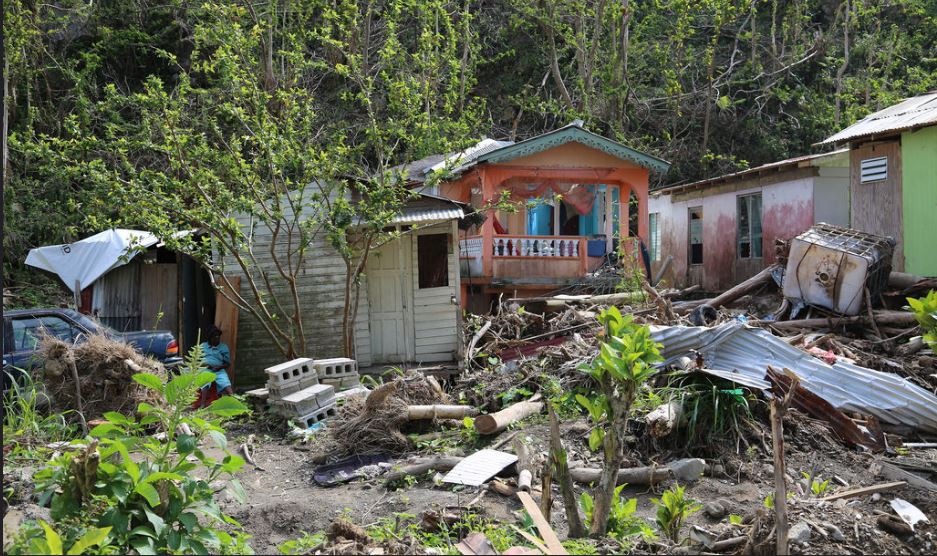Insuring the Vulnerable in a Warming World

Devastation on the Caribbean island of Dominica after Hurricane Maria, November 19, 2017 (Photo by Tanya Holden/DFID) Creative Commons license via Flickr
By Sunny Lewis
BONN, Germany, December 4, 2017 (Maximpact.com News) – The German government has just contributed €110 million (US$125 million) to bring affordable insurance against climate and other natural disasters to 400 million vulnerable people around the world by 2020.
The contribution from German Federal Ministry for Economic Cooperation and Development, BMZ, made in November follows a £30 million (US$39 million) commitment from the Government of the United Kingdom in July.
These contributions are earmarked for the InsuResilience Global Partnership for Climate and Disaster Risk Finance and Insurance Solutions, headquartered in Bonn.
Between 1980 and 2015, more than 60 percent of the people who lost their lives as a result of climate-related extreme weather events had an income of less than US$3 a day, according to the reinsurance company Munich Re in a 2016 statement.
The effects of extreme weather events force some 26 million people into poverty every year, according to a World Bank study published this year entitled “Unbreakable: Building the Resilience of the Poor in the Face of Natural Disasters.”
Although absolute economic losses are much higher in high-income countries, they only account for 0.2 percent of GDP, as compared to five percent in low income countries.
To close this protection gap, the G7 countries: Germany, France, Italy, Japan, Canada, the UK and the United States, launched the InsuResilience initiative for climate risk insurance at their summit in Elmau, Germany in June 2015.
The initiative aims to offer insurance against climate risks to an additional 400 million poor and vulnerable people in developing countries by 2020.
At the start of the initiative, only around 100 million poor and vulnerable people in Africa, Asia and Latin America were insured against climate-related risks.
At the climate negotiations in Paris in 2015 (COP21), the G7 partners made a commitment to provide US$420 million in funding for InsuResilience as a first step.
One year later, at COP22 in Marrakesh, two new partners joined the initiative: the European Union and the Netherlands. Together, the InsuResilience partners confirmed their commitment and increased their financial contributions for InsuResilience to US$550 million.
More progress on insuring the world’s most vulnerable people was made this year. The Insuring Resilient and Sustainable Cities Summit held on May 5 in Bonn was convened by the UN Environment Principles for Sustainable Insurance (PSI) Initiative and ICLEI – Local Governments for Sustainability.
Gino Van Begin, ICLEI’s Secretary General, said, “Cities are on the front line of sustainable development challenges such as climate change and natural disasters. That’s why cities are working more and more with the insurance industry to better manage risk.”
The PSI, the largest collaborative initiative between the United Nations and the insurance industry, and ICLEI, the global network of more than 1,500 cities, towns and regions, joined forces in December 2016 to create the largest collaboration between the insurance industry and cities for resilience.
The Summit was sponsored by Munich Re, a founding PSI signatory, and supported by other PSI signatories such as Allianz and Risk Management Solutions, as well as by city mayors and officials from ICLEI’s global network – from Iloilo in the Philippines and Honiara in the Solomon Islands, to Copenhagen, Denmark and Oslo, Morway.
Dr. Michael Menhart, head of Economics, Sustainability and Public Affairs at Munich Re, and a PSI Board member, said, “We are committed to implementing the UN Principles for Sustainable Insurance in our core business activities. By supporting the push for more resilient and sustainable cities, we can help turn the PSI into practice and make a contribution through our risk and resilience expertise. This is a great example of how the insurance industry can promote economic, social and environmental sustainability.”
Resilience is not only about climate. The main outcome of the PSI-ICLEI Summit was the “Bonn Ambition”, which aims to achieve three goals by June 2018, when ICLEI hosts its World Congress in Montréal, Canada.
The Bonn Ambition is strategically linked to the 17 UN Sustainable Development Goals (SDGs).
The Bonn Ambition seeks to create “Insurance Development Goals for Cities,” which would harness the insurance industry’s triple role as risk managers, risk carriers and investors in the context of the SDGs, focusing on SDG 11 – “Make cities inclusive, safe, resilient and sustainable.”
The idea is for the PSI and ICLEI to convert SDG 11’s stated targets into Insurance Development Goals that would set the long-term global agenda for the insurance industry and cities.
Participants plan to organize the first-ever roundtable of insurance industry CEOs and city mayors at the 2018 ICLEI World Congress to accelerate global and local action. The Congress is held every three years and assembles hundreds of local governments and key stakeholders to set the course for globalizing urban sustainability.
Butch Bacani, who leads the PSI at UN Environment, and who conceptualized and chaired the PSI-ICLEI Summit, said, “The Bonn Ambition clearly supports the PSI’s vision of a risk-aware world, where the insurance industry is trusted and plays its full role in enabling a healthy, safe, resilient and sustainable society. We need ambitious and decisive action now – not in 2020 or 2030 – to make the transformation to resilient and sustainable cities a reality. Time is non-renewable.”
The PSI-ICLEI Summit showed how the insurance industry could support cities as risk managers, risk carriers and investors. It explored various ways to close three key gaps in cities:
- Closing the disaster risk reduction gap – through catastrophe risk modelling, ecosystem-based adaptation, insurance loss data sharing, land-use planning, loss prevention, and disaster preparedness
- Closing the insurance protection gap – through insurance solutions for low-income people, SMEs, local governments and green technologies, including index-based insurance and usage-based insurance
- Closing the financing gap – through investments in sustainable infrastructure, energy, buildings and transportation, and instruments such as green bonds and catastrophe and resilience bonds
Jed Patrick Mabilog, mayor of Iloilo City in the Philippines, said, “To survive and thrive, we need a whole-of-society approach to climate change adaptation and mitigation and disaster risk reduction. I fully support the Bonn Ambition and look forward to its implementation.”
Andrew Leonard Mua, mayor of Honiara City in the Solomon Islands, one of the most climate and disaster-vulnerable countries, said, “No man is an island. Honiara needs to work with other cities and key stakeholders such as the insurance industry in shaping a resilient and sustainable urban future. We need to act urgently—the future is happening now.”
Featured image: Strong winds brought by Typhoon Haima toppled electric poles, damaged homes and flooded fields in the Isabela and Cagayan provinces of the Philippines, October 20, 2016 (Photo by International Federation of Red Cross and Red Crescent) Creative Commons license via Flickr.
